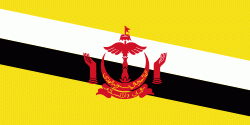Brunei dollar
$
The Brunei dollar (sign: B$, Malay: ringgit Brunei, currency code: BND), has been the currency of the Sultanate of Brunei since 1967. It is normally abbreviated with the dollar sign $, or alternatively B$ to distinguish it from other dollar-denominated currencies. It is divided into 100 sen (Malay) or cents (English). The Brunei dollar is issued by the Autoriti Monetari Brunei Darussalam (Monetary Authority of Brunei Darussalam).Under a Currency Interchangeability Agreement in 1967, the Brunei dollar is interchangeable with the Singapore dollar at par. As such, the Brunei dollar is accepted in Singapore as "customary tender"; likewise, the Singapore dollar is accepted in Brunei.
Early currency in Brunei included cowrie shells. Brunei is also famous for its bronze teapots, which were used as currency in barter trade along the coast of northern Borneo. The Spanish-American silver dollar brought over by the Manila galleons was in wide use for Brunei's international trade from the 16th to 19th centuries; the 19th century Straits dollar was itself derived from the same coin.
Brunei issued tin coins denominated in pitis in AH1285 (AD1868). These were followed by a one cent coin in AH1304 (AD1888). This cent was one hundredth of a Straits dollar.
As a protectorate of Britain in the early 20th century, Brunei used the Straits dollar from 1906, the Malayan dollar from 1939 and the Malaya and British Borneo dollar from 1953 until 1967, when it began issuing its own currency.
The Brunei dollar replaced the Malaya and British Borneo dollar in 1967 after the formation of Malaysia and the independence of Singapore. Until 23 June 1973, the Malaysian ringgit was exchangeable at par with the Singapore dollar and Brunei dollar. The Monetary Authority of Singapore and the Brunei Currency and Monetary Board (now the Authoriti Monetari Brunei Darussalam (Monetary Authority of Brunei Darussalam) still maintain the exchangeability of their two currencies. The dollar is accepted as "customary tender" in Singapore according to the Currency Interchangeability Agreement, although it is not legal tender there.
Country
-
Brunei
Brunei, formally Brunei Darussalam (Negara Brunei Darussalam, Jawi: , ), is a country located on the north coast of the island of Borneo in Southeast Asia. Apart from its South China Sea coast, it is completely surrounded by the Malaysian state of Sarawak. It is separated into two parts by the Sarawak district of Limbang. Brunei is the only sovereign state entirely on Borneo; the remainder of the island is divided between Malaysia and Indonesia. , its population was 460,345, of whom about 100,000 live in the capital and largest city, Bandar Seri Begawan. The government is an absolute monarchy ruled by its Sultan, entitled the Yang di-Pertuan, and implements a combination of English common law and sharia law, as well as general Islamic practices.
At the peak of the Bruneian Empire, Sultan Bolkiah (reigned 1485–1528) is claimed to have had control over most regions of Borneo, including modern-day Sarawak and Sabah, as well as the Sulu Archipelago off the northeast tip of Borneo, and the islands off the northwest tip of Borneo. Claims also state that they had control over Seludong (or the Kingdom of Maynila, where the modern-day Philippine capital Manila now stands) but Southeast Asian scholars believe this refers to a settlement Mount Selurong in Indonesia. The maritime state of Brunei was visited by Spain's Magellan Expedition in 1521 and fought against Spain in the 1578 Castilian War.
